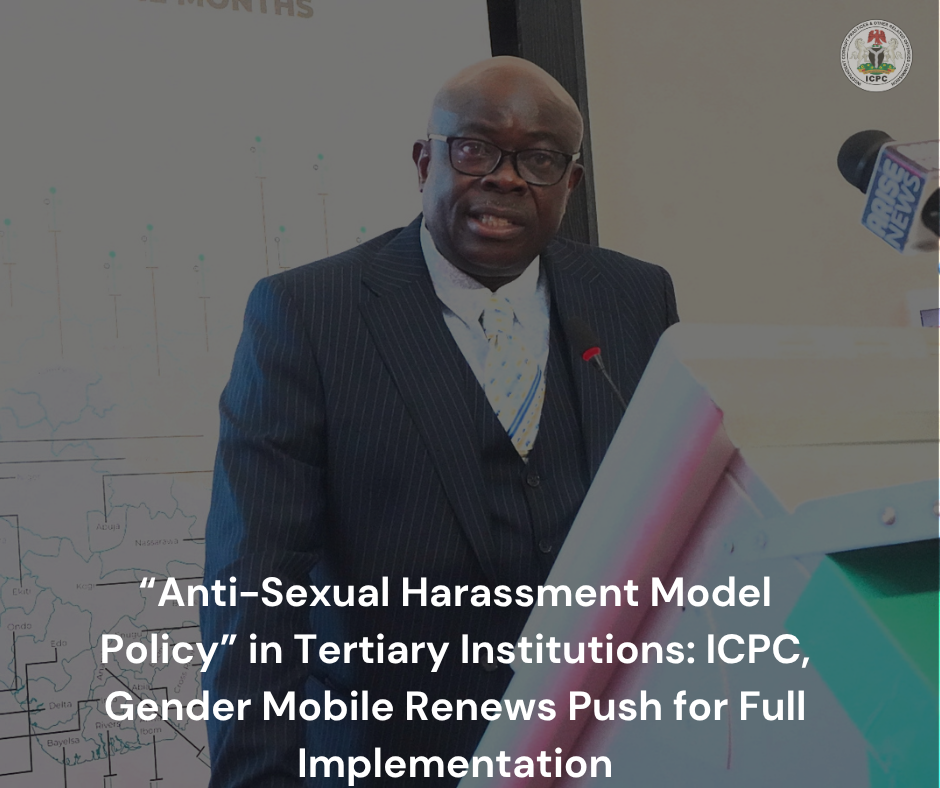The Independent Corrupt Practices and Other Related Offences Commission (ICPC) has re-emphasised the urgent need for full implementation of the Model Sexual Harassment Prevention Policy in Nigerian tertiary institutions, stressing that the policy “must go beyond paper” and be translated into full implementation.
This renewed charge was the central message at a one-day stakeholders’ engagement co-hosted by the ICPC with Gender Mobile Initiative and the FCT Education Secretariat, which took place at the ICPC headquarters on Thursday in Abuja.
The event forms part of the activities targeted at driving states’ level adoption of the Model Anti-Sexual Harassment Policy.
Delivering his special remarks, the Honourable Chairman, ICPC, Dr. Musa Adamu Aliyu, SAN, who was represented by the Secretary to the Commission, Mr. Clifford Okwudiri Oparaodu, DSSRS, welcomed participants and reiterated the Commission’s commitment to fighting corruption in all forms, including abuse of office through sexual harassment in educational institutions.
Dr. Aliyu highlighted ICPC’s longstanding collaboration with Gender Mobile Initiative and Ford Foundation, which led to the development of a Model Sexual Harassment Prevention Policy aligned with the Commission’s mandate under Section 6 of the ICPC Act.
He revealed that the initiative also supports Gender Mobile’s Campus Safety Initiative (CSI), aimed at leveraging technology and education to prevent sexual harassment, clarifying that while many institutions already have internal policies in place, the model policy serves as a benchmark to help them strengthen those policies or adopt new ones that reflect best practices.
“Sexual harassment is not only a form of Sexual and Gender-Based Violence; it is a form of abuse of office and a crime,” he stated.
The Chairman acknowledged that the fight against corruption, especially within educational institutions, cannot be waged by the ICPC alone.
“If you want to go fast, go alone, but if you want to go far, go together,” he said, noting the importance of joint efforts between the public and civil society sectors.
He further noted that ICPC, with support from the Ford Foundation, also developed model policies for secondary and basic educational institutions, which have been approved by the Federal Ministry of Education and are available on the Commission’s website.
While encouraging institutions to adopt or adapt the policy to suit their unique contexts, the ICPC Boss stressed that continuous and consistent engagement remains vital, as “no one, irrespective of age, status, or gender, is immune from being a direct or indirect victim of sexual harassment.”
Present at the event to deliver a welcome address was the FCT Mandate Secretary for Education, Dr. Danlami Hayyo, who commended the ICPC in partnership with the Gender Mobile Initiative (GMI) and other stakeholders who worked hard to bring the model policy to life in all institutions.
He stated that sexual harassment is a menace that denies many victims their rights to full participation in society, urging educational institutions to lead the charge against the menace.
The Mandate Secretary further emphasised that as much as sexual harassment can stem from power imbalance, it can also occur between individuals of equal standing.
He enjoined all stakeholders to implement zero tolerance against sexual harassment and ensure confidentiality for complainants.
A Campus Safety Initiative Framework presentation was delivered by the Executive Lead, Gender Mobile Initiative (GMI), Barr. Omowumi Ogunrotimi, who gave an overview of the Anti-Sexual Harassment Policy, By-Stander Intervention, Preventive Education, CampusPal App, and an advocacy brief.
A Keynote Address was delivered by the Spokesperson, Federal House of Representatives, Hon. Akintunde Rotimi who was represented by Mr. Temidayo Taiwo Sadiq with Goodwill Messages from the SSA to the President on Student Engagement, representative of the National Female Students Association of Nigeria (NFSAN), Executive Secretary of the National Universities Commission (NUC) and representative of National Board of Technical Education (NBTE).
The event was concluded with the presentation of the communique and closing remarks.
Gender Mobile Initiative was established in October 2017 to complement the programmes and policy efforts of the government in advancing intersectional gender quality and eliminating all forms of sexual and gender-based violence, which undermines women’s potential, agency, and freedom. It is upon this strength that the Gender Mobile has found a dependable ally in the ICPC, being an agency of government that has continued to effectively deploy its mandates to tackle sexual harassment offences.


